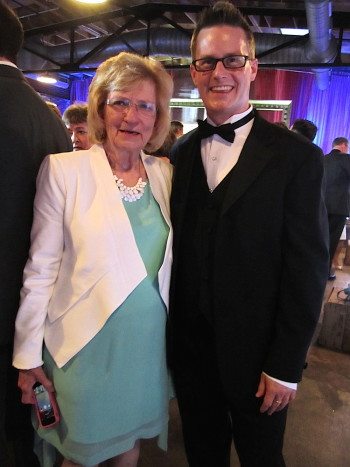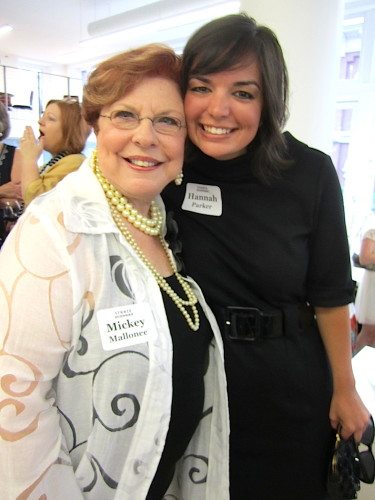 Sponsors are the lifeblood of event planners. But how do you determine who to approach for help?
Sponsors are the lifeblood of event planners. But how do you determine who to approach for help?
We went to the experts at the Knoxville Museum of Art, Clarence Brown Theatre and Knox Heritage for answers.
Susan Hyde, David Byrd and Mickey Mallonee have two things in common – they help to oversee nonprofits that are vital to the community, and they actively seek sponsors for events. The missions for the three organizations differ – Knox Heritage is dedicated to preservation, the museum showcases regionally significant art and the theater serves as both a cultural attraction and teaching environment.
But all three rely on sponsors, and all three say relationships are key.
“You have to connect,” said Mallonee, the director of events for Historic Westwood. “It’s not just going to happen.”
Mallonee added another critical piece of advice. If a desired sponsor declines one event, that doesn’t mean the next event won’t get a yes.
“You don’t want to alienate anyone,” she said. “You may be able to come back around.”
Placing a sponsor with a specific event can be compared to interlocking pieces of a puzzle.

Hyde, the director of development for the museum, said, “Every event is different, and as a fundraising professional or a fundraising volunteer, you must determine who the target audience is for your program or event, and then match that audience to appropriate businesses that could best benefit from sponsorship or those individuals who would have a personal interest in sponsoring the program or fundraiser.”
Mallonee recommended using the Internet to read mission statements before approaching a company.
She has been able to glean information from those statements to pitch a specific sponsorship that appeals to a company’s philanthropic goals.
Byrd, the managing director for CBT, has a two-pronged process to find sponsors for Clarence Brown Theatre events. The first is a long-term strategy to identify a list of prospects that he can approach, in concert with the theater’s board and University of Tennessee development officials. This list will include those with an established relationship with the theater.
The second approach is to attach sponsors to specific plays, based on content that could appeal to that company’s mission or product.

“We have different places to plug people in,” Byrd said. “It provides some built-in flexibility. When I am negotiating with a corporate sponsor, we will tailor. We want it to work for you.”
Another factor for event planners to consider is when to have an exclusive sponsor and when to seek multiple ones.
“There are two schools of thought, and I use both at different times, and yes, the type of event will guide you,” Hyde said. “If it is an exhibition and I can cover the entire cost of the exhibition with one lead sponsor, I will oftentimes offer an exclusive sponsorship as the presenting sponsor.
“For fundraising events, I find it most beneficial to have an overall presenting sponsor, with layers of descending sponsorship levels, giving an appropriate title to each sponsorship level. Some organizations give titles to their sponsorships, i.e., the printing sponsor, the silent auction sponsor, the live auction sponsor, etc. I find it smoother to treat the event as a whole and have levels of sponsors for the entire event.”
Byrd also understands the benefit of both approaches. An exclusive sponsorship is akin to a “seal of approval,” he said. It also is important for the theater to maintain tiers of sponsorship and support.
“Other sponsor levels are so incredibly important and moving a patron up that giving ladder,” Byrd said.

Mallonee noted some events have a “naming sponsor,” but planners can find opportunities for other companies to contribute. She cited the free Knoxville Symphony Orchestra concert during Festival on the Fourth.
“When I was with the city, Pilot, of course, always sponsored the symphony, but for the other events, like the Kid Zone, we had other sponsors,” Mallonee said. “There’s always something to hang your hat on.”
Hyde also recommended being careful with multiple sponsors to avoid overlap.
“Never lose the trust of a donor or sponsor by allowing competitors to sponsor the same program or event,” Hyde said. “If it is a very high-profile event, the industry exclusivity could possibly start at a higher level of sponsorship, but as a general rule, keep competitors on separate programs and events.
“It will serve both your organization and your sponsors well and allow for longstanding partnerships.”
An ideal sponsor also is amenable to all ideas.
“The corporate sponsor you want to find is: ‘No holds barred. Put us on something,’ ” Byrd said. “They believe in what you’re doing and your mission so much.”
Byrd, Mallonee and Hyde also agreed that Knoxville is a great place to be an event planner.
“We are so fortunate,” Mallonee said. “The corporations are willing to give until it hurts actually to make our community better.”
Maria Cornelius, a writer/editor for Moxley Carmichael, populates the EventCheck calendar. She is more likely to attend your event if it meets three criteria: cats and dogs present, sports on television and Miller Lite on ice in the vintage bottle.